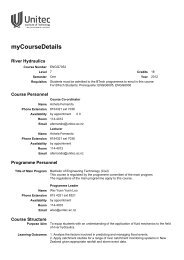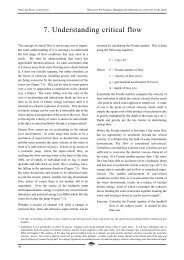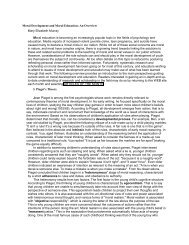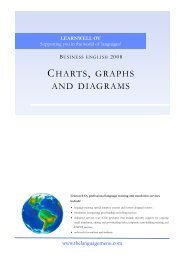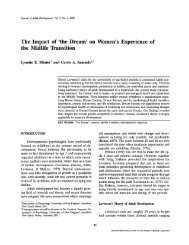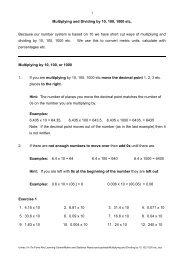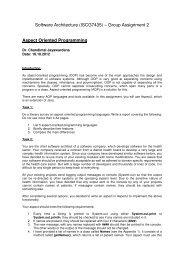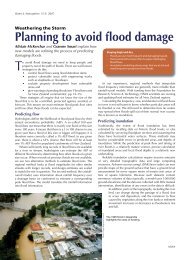WHAT POSTFORMAL THOUGHT IS, AND WHY IT MATTERS
WHAT POSTFORMAL THOUGHT IS, AND WHY IT MATTERS
WHAT POSTFORMAL THOUGHT IS, AND WHY IT MATTERS
Create successful ePaper yourself
Turn your PDF publications into a flip-book with our unique Google optimized e-Paper software.
<strong>WHAT</strong> <strong>POSTFORMAL</strong> <strong>THOUGHT</strong> <strong>IS</strong> <strong>AND</strong> <strong>WHY</strong> <strong>IT</strong> <strong>MATTERS</strong> 325<br />
time is spent trying to keep certain parents away from their children and the other<br />
half of the time we are trying to get parents to be closer to their children.”<br />
Example 3. Metasystematic 12. “Recently, an elder in the community observed<br />
that ‘our children’s needs are farther from being met than ever.’ She mentioned<br />
that she has been struggling with the question, ‘What is the function of children in<br />
our society today?’ In agrarian societies, they are field workers. In early industrial<br />
societies, they are labor in home-based businesses or factories. In such societies,<br />
their function is to help support their families. A political scientist told her that in<br />
this westernized society, children’s function is to support the economy by being<br />
the country’s largest group of consumers. The flow of resources into the family<br />
economy from child labor has been reversed by children’s new social function.<br />
Indeed, society seems far, far away from regarding children as not for serving<br />
utilitarian functions.”<br />
DESCRIPTIONS OF THE STAGES OF <strong>POSTFORMAL</strong> <strong>THOUGHT</strong><br />
Systematic Stage<br />
At the Systematic 1 stage, people solve multivariate problems. Sometimes this<br />
involves discriminating the frameworks in which relationships between variables<br />
are embedded. The systems of relationships are formed out of relations among<br />
variables. Thus, the elements that are coordinated by systematic task actions are<br />
multiple relations among abstract order variables. The tasks include: (a) determining<br />
possible multivariate causes—outcomes that may be determined by many<br />
causes; (b) the building of multivariate representations of information in the form<br />
of tables, matrices, diagrams, or narrative; and (c) the multidimensional ordering<br />
of possibilities, including the acts of preference and prioritization. Such actions<br />
generate systems of tendencies and relationships. Perceptions of such systems<br />
generated give the appearance of a single “true” unifying structure. Other systems<br />
of explanation or even other sets of data collected by adherents of other<br />
explanatory systems tend to be rejected. New findings that do not fit within the<br />
present system are often rejected out of hand. Most standard science operates at<br />
this order. At this order, science is seen as an interlocking set of relationships, with<br />
the truth of each relationship in interaction with embedded, testable relationships.<br />
Researchers carry out variations of previous experiments. Behavior of events is<br />
seen as governed by multivariate causality. Our estimates are that only 20 percent<br />
of the U.S. population now function at the Systematic stage without support.<br />
Metasystematic Stage<br />
At the Metasystematic stage, people can act on systems. The systems are as described<br />
earlier. Such systems of relations are the objects of metasystematic tasks<br />
or actions. Metasystematic actions compare, contrast, transform, and synthesize<br />
systems. One can compare and contrast systems in terms of their properties, with<br />
a focus on the similarities and differences in each system’s form, as well as constituent<br />
causal relations and actors within them. The products or results are metasystems<br />
sometimes referred to as supersystems. These complex understandings



